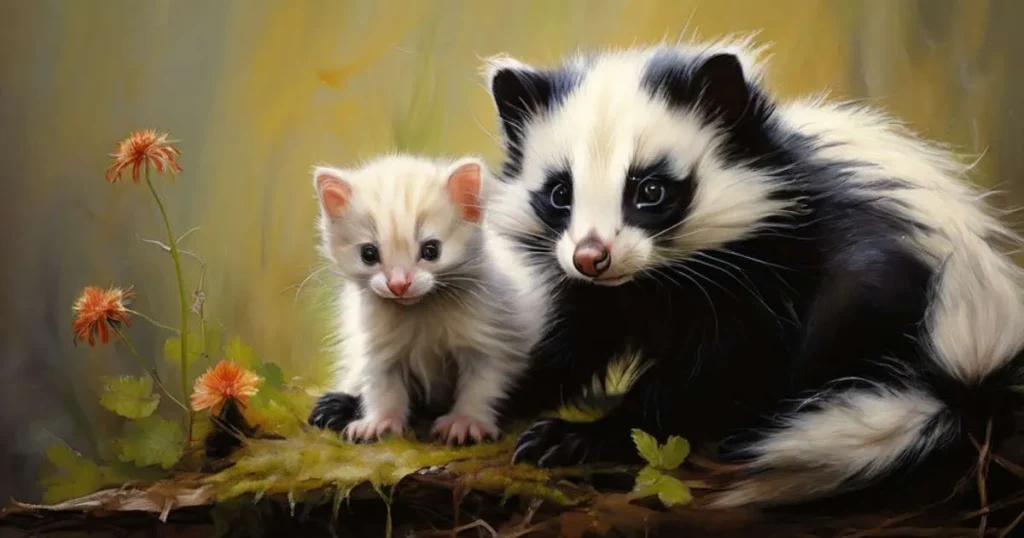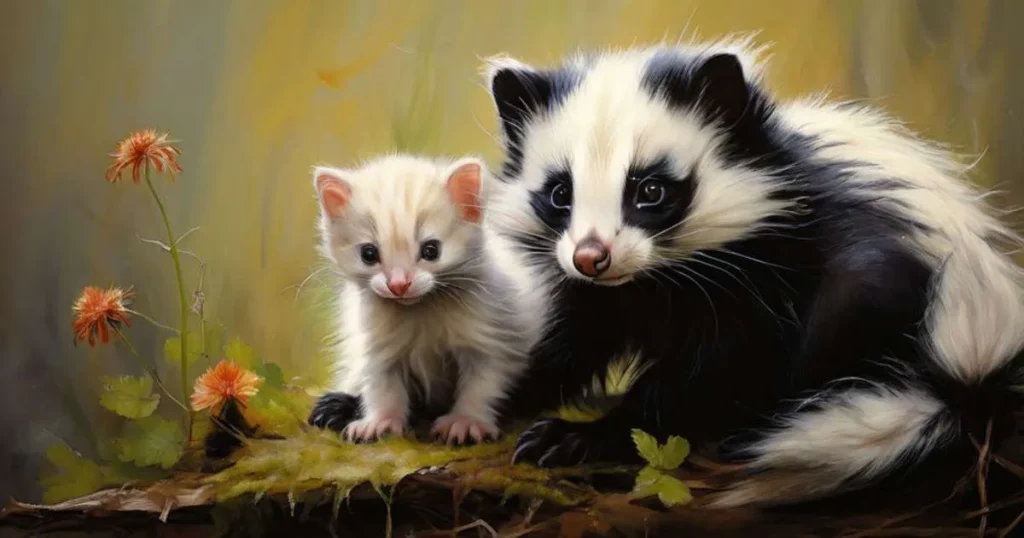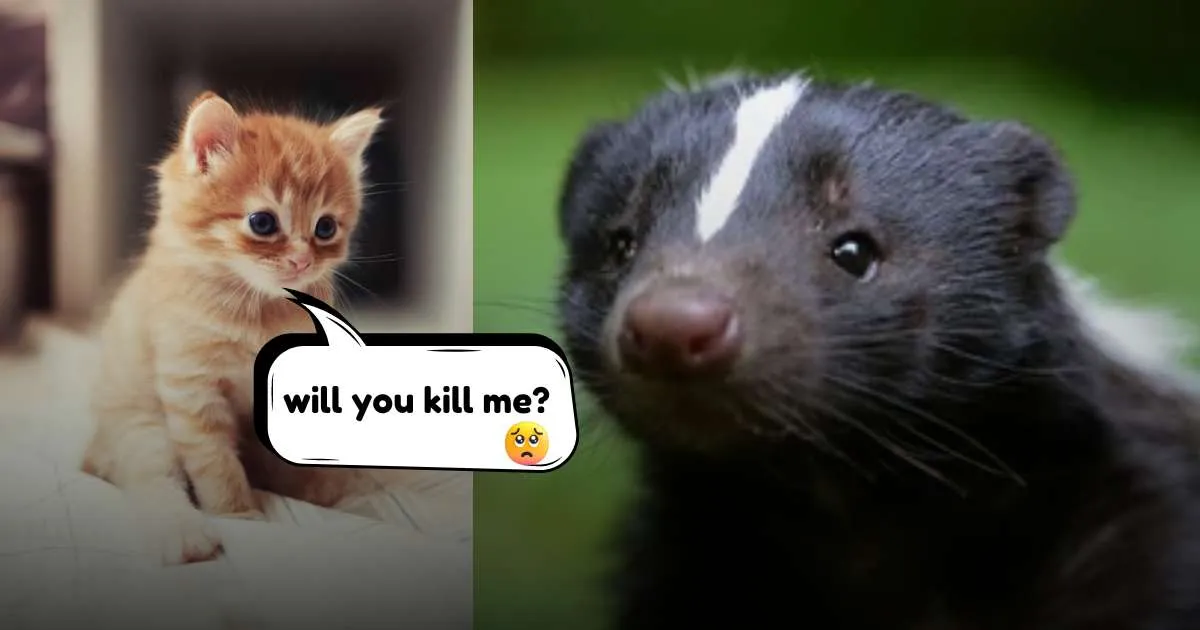Do Skunks Eat Kittens? A Skunk Owner’s Insight
As a devoted skunk owner and wildlife enthusiast, I often hear concerns about the dietary habits of these fascinating creatures. One particularly alarming question is, Do skunks eat kittens? While skunks are opportunistic feeders with a varied diet, the good news is that skunks are not natural predators of kittens. However, certain circumstances could lead to interactions between the two, especially if food is scarce or kittens are left vulnerable.
In this article, we’ll explore skunks’ eating habits, why they typically avoid kittens, and how to protect your pets while appreciating skunks’ role in the ecosystem.
Understanding Skunk Diets
Skunks are omnivores, meaning they consume both plants and animals. Their natural diet consists of a variety of foods depending on the season and availability.
What Skunks Usually Eat
- Animal-Based Foods: Insects, grubs, worms, small rodents (mice, voles, shrews), bird eggs, and small amphibians.
- Plant-Based Foods: Fruits, berries, nuts, and seeds.
- Scavenged Foods: Carrion, garbage, and leftovers from other predators.
Skunks are scavengers and opportunists, preferring easy-to-obtain food. While they may occasionally scavenge from larger animals, they are not known for hunting larger prey like kittens.
Do Skunks Pose a Threat to Kittens?
The likelihood of a skunk attacking or eating a kitten is extremely low. However, certain conditions might put kittens at risk of interactions with skunks:
Unlikely Predators
Skunks are neither fast nor stealthy hunters. They lack the physical ability to overpower larger prey like kittens. Their hunting style involves digging for insects or opportunistically scavenging smaller, defenseless prey.
- Kittens’ Size: While kittens are small, they are generally too large and active for skunks to target.
- Skunks’ Behavior: Skunks are non-aggressive and tend to avoid confrontations unless cornered.
When Skunks Might Interact With Kittens
- Food Scarcity: In rare cases of extreme hunger, skunks might investigate vulnerable animals, but this is highly uncommon.
- Scavenging: If a kitten is injured or deceased, a skunk might scavenge, as they do with carrion.
- Nest Disturbance: If kittens are left in a den or area where a skunk is searching for food, the skunk might interact with them out of curiosity rather than aggression.

Protecting Kittens From Wildlife
While skunks pose little danger to kittens, it’s essential to take precautions to keep your pets safe from all potential wildlife threats.
Tips for Keeping Kittens Safe
- Supervised Outdoor Time: Always supervise kittens when they are outside, especially during the evening and night when skunks are most active.
- Secure Nesting Areas: If your kittens are very young, keep them in a secure area away from potential wildlife entry points.
- Avoid Attracting Skunks:
- Remove food sources like pet food, fallen fruit, and garbage.
- Seal off areas where skunks might shelter, such as under porches or sheds.
- Use Deterrents: Motion-activated lights or sprinklers can discourage skunks from entering your yard.
Skunks and Kittens: Coexistence
Understanding the behavior of both skunks and kittens is key to harmonious coexistence. Skunks are generally harmless animals that prefer insects, plants, and small prey. Here’s why they’re unlikely to target kittens:
Skunks’ Characteristics
- Nocturnal: Active at night when kittens are usually indoors.
- Shy Nature: Skunks avoid confrontation and flee rather than attack.
- Preference for Easier Prey: Skunks opt for small, defenseless prey like insects or rodents.
When to Be Concerned
While skunks are not a natural threat to kittens, it’s wise to watch for other potential predators, such as raccoons, coyotes, or stray dogs, which are more likely to harm kittens.
The Role of Skunks in the Ecosystem
Skunks play an essential role in maintaining ecological balance. By consuming pests like grubs, insects, and rodents, skunks help control populations that could otherwise harm gardens and crops. They are beneficial to have around as natural pest controllers, and their interactions with pets are generally harmless.

Frequently Asked Questions
Can skunks eat kittens?
It’s highly unlikely. Skunks are not equipped to hunt or kill kittens and usually avoid animals that pose any challenge.
Do skunks harm pets?
Skunks are generally non-aggressive but may spray pets in self-defense if threatened. They are more interested in scavenging than attacking.
How do I keep skunks away from my yard?
Secure garbage cans, remove outdoor pet food, and use motion-activated lights or sprinklers to deter skunks.
Conclusion
While the idea of a skunk eating a kitten may sound concerning, it’s a rare and highly unlikely scenario. Skunks are scavengers and opportunists, focusing on easier food sources like insects, rodents, and fruits. By taking simple precautions, you can protect your kittens while appreciating the ecological role of skunks.
As a skunk owner and advocate, I believe understanding their habits and respecting their place in the environment helps us coexist peacefully with these unique creatures. Rest assured, your kittens are safe from these gentle scavengers!

